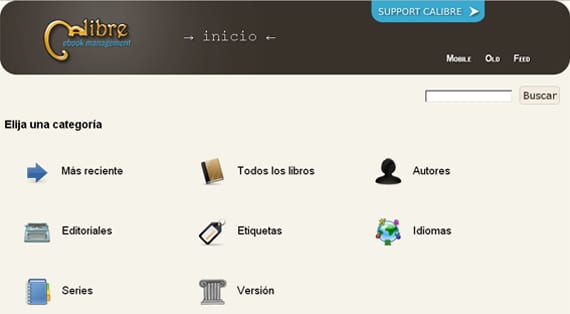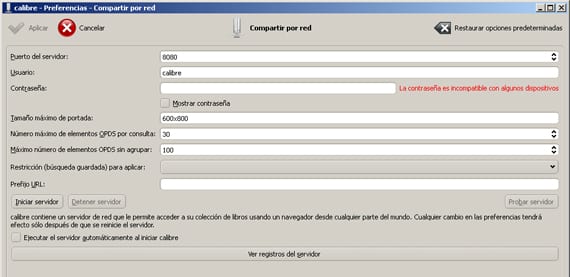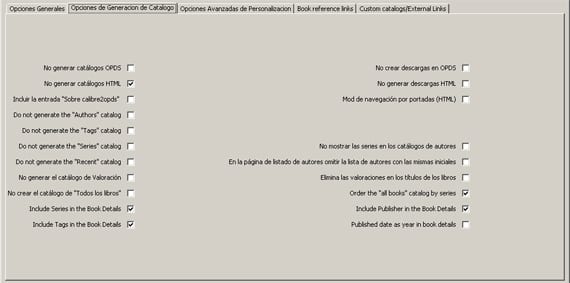
At the time I insisted a lot on the importance of the metadata that we insert in Caliber, on the one hand because it is very good to have a book with all the possible information and on the other, but much more important, because it is this metadata that then allows us to do a lot of things with our Caliber libraries.
Today I am going to comment on one of the things we can do using metadata and that, well done, leads to a practical and "eye-catching" result. Maybe this way you will realize that I am a pain with metadata (yes, it is true, I admit it), but I do it for the good of our digital libraries.
The first is know what OPDS is (Open Publication Distribution System): a simple system of subscription to electronic publications based on Atom and html that allows the aggregation, localization and distribution of these publications.
To use a OPDS catalog we multitude of applications for different devices, browsers and / or operating systems:
- For Android we have Aldiko, Cool Reader (this guy never ceases to amaze us), EBookDroid, Mantano Reader, Moon + Reader Pro, PageTurner Reader,
- For iPad and its Apple brothers we have eBookSearch, Infinite Book Reader, MegaReader, Ouiivo Reader, QuickReader, Stanza (one of the most used).
- To be able to use it in your browser FirefoxIf you don't have an Android or Apple device, you can choose ePUBReader.
It is important to remember that Caliber has an integrated OPDS server, so it is very easy to share information about the books we have in our library as long as we have Caliber running, the server running, and access to the network, all simultaneously and on the same PC.

And the truth is that It works very well and it allows us to search, order the contents of the library by title, author, collection, subscribe via RSS, etc. In addition, the books that we add to Caliber appear immediately on the server without us having to do anything else.
La default address would be http: // public-ip: 8080 although we can modify the parameters depending on the ports that we have open in our router to access from the outside. In the case of accessing from the local network, instead of the public IP we should use the local IP or the name of the computer on which Caliber is running.
So if Caliber already has that, doeswhat's the point of installing an additional program as Caliber2OPDS? It's simple: if we generate an OPDS catalog with Calibre2OPDS we don't have to have Caliber running to access our entire library, we can host it on a web server (until not long ago we could even host it in Dropbox) and use it from there on any device with access.
Other than that, it is more configurable than Caliber's own server, as we are going to see.

First we can choose where to create the catalog- on the computer running Caliber, on a different server (a NAS, a file hosting service, a dedicated server, etc.) or even on the reader (although unfortunately this option is only available for Nook) .
We can also choose what kind of catalogs we want to create: authors, tags, collections, recent; as well as we can also decide whether or not to include the download option, the valuation of the books, etc.
It is also possible to decide which formats "you will see", so that you create a catalog with the works that we have in ePUB, in pdf, or any of the formats that we have.
Likewise, we have the possibility of link to external pages containing information from the book. The program already contains a series of references, but they can be modified (if you have the desire and the right knowledge, of course).
I leave you a example of links and cross references which automatically includes in the file of one of the books in my library: The Harkonnen House by Kevin J. Anderson and Brian Herbert.
Related catalogs
- Book 2 in the Prelude to Dune series (Yes, the text seems a bit Sioux, what are we going to do)
- 12 books by Kevin J. Anderson
- 8 books by Brian Herbert
- 792 science fiction books
- 5.468 books in Lang: en
Outlinks
- This book on Goodreads
- This book on Wikipedia
- This book on LibraryThing
- This book on Amazon
- Kevin J. Anderson at Goodreads
- Brian Herbert on Goodreads
- Kevin J. Anderson on Wikipedia
- Brian Herbert on Wikipedia
- Kevin J. Anderson at LibraryThing
- Brian Herbert at LibraryThing
- Kevin J. Anderson on Amazon
- Brian Herbert on Amazon
- Kevin J. Anderson at ISFDB
- Brian Herbert at ISFDB
Once configured and automated the entire process, we create the catalog and the program generates a folder called _catalog where it includes all the files necessary for managing the catalog (.css, .html, .js) apart from folders in which we will have all the books of the chosen library. If we feel like it, we have the necessary knowledge and we dare, we can modify the css and html files so that the appearance of the catalog is more to our liking.
The main drawbacks what I see in the program: the translation is incomplete (or incorrect, that depends on tastes), it does not allow modifying the appearance of the resulting web, it does not allow making "partial" catalogs, which (from my point of view) is a result less "perfect" than would be desirable.
As I already indicated, Caliber manages its OPDS catalog very well, so I limit myself to propose one more option, for you to try it, value it and, if you like it, give it a chance (although you can also look for other alternatives that you like more, of course).
More information - Our digital library managed with Caliber (II)
Source - OPDS (Wikipedia) , Calibre2OPDS website
Very interesting, although I must confess that I am still somewhat entangled with the matter, I will read the subject more and follow some of the advice you give.
If you want, tell me what doubts you have, to see if we can clarify them.
Thanks, although I can't install caliber2opds on windows (before with xp I had it and it worked fine, now it gives me an error when installing it)
Do you have java well installed? Do you have another Windows? Sight? 7?
I am testing this program because I am interested in having a printable book list. Do you know if there is any way to print the generated catalog? Greetings and thanks.